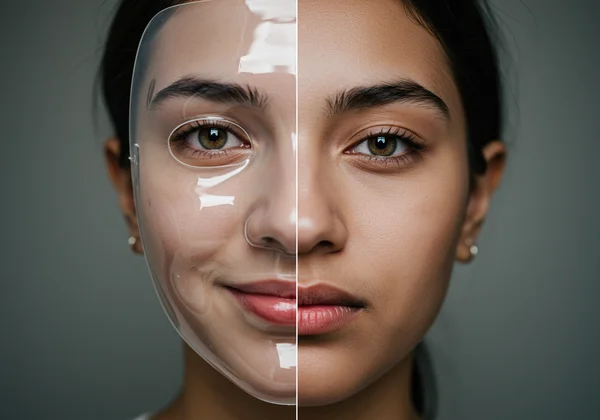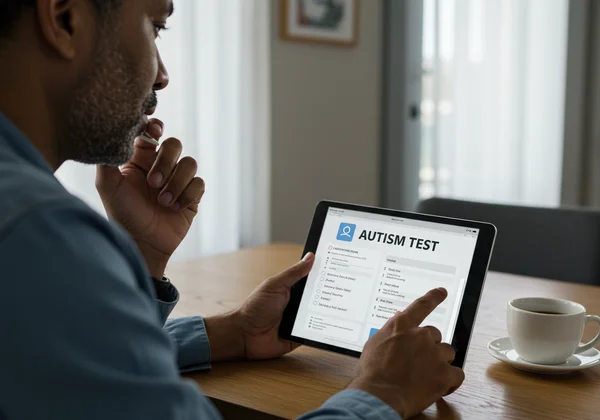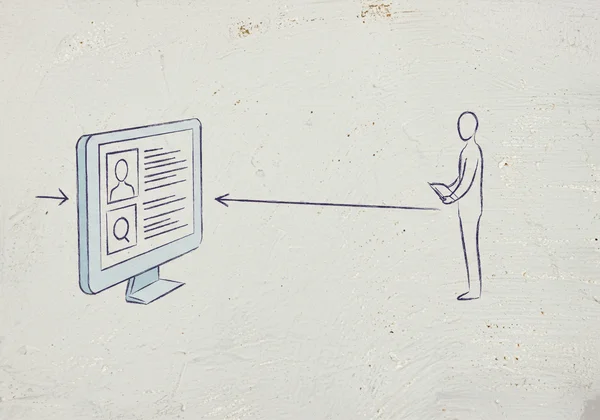Adult Autism Test: Subtle Signs & Undiagnosed Traits
July 21, 2025 | By Seraphina Rivers
Have you ever felt like you're operating on a different wavelength from everyone else? Maybe you've spent years feeling that social rules are an unspoken language you can't quite master, or you find immense comfort in routines that others find rigid. If you're an adult asking yourself, "Do I have autism test" questions, you're not alone. Many adults are discovering that traits they've had their whole lives align with Autism Spectrum Disorder (ASD), which often presents differently than the childhood stereotypes we see in media. Taking a reliable Autism Test is a crucial first step toward self-understanding.

This guide explores the subtle signs of autism in adults and why it so often goes undiagnosed. Clarity begins with understanding your own traits, and a great starting point is to explore your traits with an online screening tool designed to provide preliminary insights.
Beyond Childhood Stereotypes: Understanding Adult Autism
The common image of autism is often limited to non-verbal children or characters with extraordinary but specific talents. This narrow view fails to capture the vast and diverse experiences of autistic adults. Understanding adult autism requires moving past these stereotypes and recognizing it as a spectrum of neurodevelopmental differences.
The Evolving Definition of Autism Spectrum Disorder
Our understanding of autism has grown significantly. It's now recognized as Autism Spectrum Disorder (ASD), emphasizing a wide range of traits and support needs. This spectrum includes individuals who may not have received a diagnosis in childhood because their signs were less obvious or they developed sophisticated coping mechanisms. The focus has shifted from a list of "deficits" to a more holistic view of a different neurological wiring that comes with both challenges and unique strengths.
Why Adult Presentations Differ from Childhood Signs
Many autistic adults don't fit the classic mold because they've spent a lifetime adapting. Unlike children, adults have had decades to observe social behavior and learn to imitate it, a process known as masking or camouflaging. This can make their autistic traits much more subtle. An adult's social exhaustion, intense but niche hobbies, or need for solitude may be dismissed as personality quirks rather than signs of underlying neurodivergence. A comprehensive adult autism test considers these nuanced adult experiences.
Subtle Signs of Autism in Adults You Might Overlook
The characteristics of autism in adults are often internalized or expressed in ways that are easily misinterpreted. Recognizing these subtle signs is key to understanding yourself or a loved one better. These are not just quirks; they are patterns of experience rooted in a different way of processing the world.
Social Interactions: More Than Just Being Shy or Awkward
For many autistic adults, social interaction is a cognitive puzzle, not an intuitive dance. This can manifest as:
- Manual Socializing: Feeling like you're consciously "running a script" in conversations, which can be exhausting.
- Difficulty with Small Talk: Finding chitchat pointless or difficult to navigate, preferring deep dives into specific topics.
- Misinterpreting Social Cues: Missing sarcasm, unspoken rules, or body language, leading to misunderstandings.
- A Different Social Drive: You might enjoy social interaction but in smaller doses or structured settings, feeling quickly drained in large groups.
Sensory Sensitivities & Overload Responses
The autistic brain often processes sensory information differently. This isn't just a preference; it's a neurological reality.
-
Hypersensitivity: Everyday sounds (like chewing or a ticking clock), lights (fluorescent bulbs), textures (scratchy tags on clothing), or smells can feel overwhelming and physically painful.
-
Hyposensitivity: You might not notice pain or temperature extremes, or you may seek out intense sensory input like loud music or spicy food.
-
Sensory Overload: When sensory input becomes too much, it can lead to a "shutdown" (withdrawing and becoming non-communicative) or a "meltdown" (an intense, involuntary loss of emotional and behavioral control).

Repetitive Behaviors, Special Interests, and Routine Preferences
The need for predictability and a focus on specific interests are core autistic traits that look different in adulthood.
- Adult Stimming: Repetitive behaviors (stimming) that self-soothe may be more subtle, like tapping a foot, twirling hair, or pacing while thinking.
- Special Interests: These are not just hobbies; they are deep, passionate areas of focus that provide immense joy and knowledge. An autistic adult might have an encyclopedic understanding of a specific historical period, a TV show, or a technical field.
- Reliance on Routine: A strong preference for routine provides comfort and reduces anxiety. Unexpected changes to a plan can be genuinely distressing and require significant mental energy to navigate.
Executive Function Challenges & Emotional Regulation
Difficulties with executive functions—the brain's management system—are common. This can impact organization, planning, and emotional control.
- Planning and Prioritization: You might struggle to break down large tasks, manage time effectively, or start a project (autistic inertia).
- Emotional Regulation: Difficulty identifying and managing emotions can lead to what appears to be an overreaction. This is often because the emotion builds internally until it becomes overwhelming.
- Alexithymia: A common co-occurring trait is alexithymia, the difficulty in recognizing and naming one's own emotions.
Why Many Adults Go Undiagnosed: The Masking Phenomenon
If these traits resonate deeply, you might wonder why they were never identified before. The primary reason is a phenomenon known as autistic masking or camouflaging. This is especially true for those with what was once called "high functioning autism" and for women.
The Art of Camouflaging: What is Autistic Masking?
Autistic masking is the conscious or subconscious suppression of natural autistic traits to fit in with neurotypical peers. It's a survival strategy learned over years of feeling different. Masking can involve forcing eye contact even when it's uncomfortable, mimicking the social behaviors of others, and hiding stims. While it can help an autistic person navigate a neurotypical world, it comes at a tremendous cost, often leading to burnout, anxiety, and a lost sense of self.

Autism in Women: Often Overlooked and Misdiagnosed
Autism in women is frequently missed because their presentation often differs from the male-centric model historically used for diagnosis. Societal pressure on girls to be more socially adept means they often become highly skilled maskers from a young age. Their special interests may be seen as more "socially acceptable" (e.g., literature, animals, psychology), and their social difficulties can be mislabeled as shyness, anxiety, or even a personality disorder. A screening tool developed with these differences in mind can be a valuable first step.
The Consequences of Undiagnosed Autism in Adulthood
Living without understanding your own neurotype can be profoundly damaging. Many undiagnosed autistic adults struggle with chronic anxiety, depression, and burnout from the constant effort of masking. They may have a history of feeling like a failure or being "too sensitive" without knowing why. Gaining clarity can be life-changing, providing a framework to understand past struggles and build a more authentic, accommodating life. Taking a free autism test can be the start of that journey.
Taking the Next Step Towards Self-Understanding
Recognizing subtle signs of autism can be a validating and empowering experience. It's not just about a label, but about gaining a deeper understanding of your mind. This self-knowledge empowers you to be kinder to yourself, better understand your needs, and find supportive environments and strategies.
If this article resonates, your journey of self-discovery is truly just beginning. A valuable next step can be to take a confidential and reliable Autism Test designed specifically for adults. Here, we offer a science-inspired screening tool that can provide you with immediate, personalized insights. It is a starting point, not a diagnosis, but it can give you the clarity you need to decide your next steps.

Start your free autism screening today and take the first step toward a more authentic you.
Frequently Asked Questions About Adult Autism & Screening
Are online autism tests accurate for adults?
Online screening tests, like the one offered on our site, are designed to be reliable indicators of autistic traits based on established scientific questionnaires (like the AQ test). They are highly accurate for screening purposes and can tell you if you have a high number of traits associated with ASD. However, they are not a substitute for a formal diagnosis from a qualified healthcare professional.
What does a high score on an adult autism test mean?
A high score suggests that you possess many traits commonly found in autistic individuals. This can be a strong indicator that you may be on the autism spectrum. We recommend using this result as a starting point for further exploration and to discuss with a professional who can conduct a comprehensive diagnostic assessment. Consider it a piece of valuable data on your journey of self-discovery.

Can you self-diagnose autism based on these signs?
While self-diagnosis is a valid and affirming process for many in the autistic community, a formal diagnosis is often necessary to access workplace accommodations or support services. The signs listed here can help you understand your experiences, but a professional assessment can confirm them and rule out other conditions. A reliable screening tool can help bridge the gap between suspicion and professional consultation.
How does autism present differently in adult females?
Autism in adult females is often characterized by stronger masking abilities, more socially acceptable special interests, and internalized difficulties like anxiety and depression. They may have a small but intense circle of friends rather than broad social difficulties. Because of this, their traits are frequently misdiagnosed as anxiety, BPD, or social awkwardness.
What should I do after taking an online autism screening test?
After receiving your results, take some time to reflect on them. If your score indicates a high likelihood of autistic traits, you can use our optional AI-powered report to gain deeper, personalized insights. The next recommended step is to find a psychologist or psychiatrist specializing in adult autism to discuss your results and pursue a formal assessment if you choose.